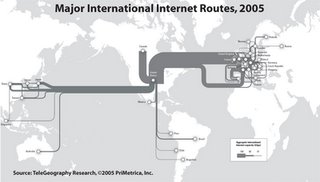Why? For starters, calls between the two countries untill recently were routed through Europe/US. Now traffic will no longer need to travel half way across the planet. Here in the south, we would have called that going around your elbow to get to your behind. This means reduced role for major US carriers like Level 3, MCI and AT&T (currently the world’s largest ISP... yes, they finally bested MCI/UUnet thanks to the SBC merger). It appears this trend is gathering momentum, and slowly network traffic that almost always used to flow through US is becoming more and more regional. Through most of the 1990s it was cheaper to connect individual European Union (EU) countries through US. In the late 90's and early 2000, small regional networks started to siphon off traffic a country at a time.
 Asia network traffic is following the same trajectory. At some point in the future this is bound to have an impact on the US based carriers. Currently, the US is the top Internet hub country with 1.4 terabits/second of bandwidth. World’s fattest pipes (metaphorically speaking) are between London and New York, about 320 GB/s of bandwidth.
Asia network traffic is following the same trajectory. At some point in the future this is bound to have an impact on the US based carriers. Currently, the US is the top Internet hub country with 1.4 terabits/second of bandwidth. World’s fattest pipes (metaphorically speaking) are between London and New York, about 320 GB/s of bandwidth. Will the regionalization of the traffic mean price wars will rear their ugly head? Will the prices plunge on the London-New York routes as once again capacity outstrips demand? Some folks who work in the bandwidth business are muttering that the transit fees, that once used to make up nice profit center for global carriers, are beginning to wane. This probably explains at least part of the back story in the flap between Level3 and Cogent over private peering last month. (People don't want pay Level3's rates for transit anymore... they're often seen as too high.)
Looking beyond the obvious - is this a general global economic trend? I won't pretend to know anything substantive about global trade, but my broadband crystal ball (with fresh batteries and all!) indicates that this could be forbearer of a global trade shift. I believe that what oceanic/sea routes, air routes and highways were to the 20th century, broadband pipes are to the 21st century. From that perspective, things could be shifting away from the US being the hub of global trade. [Is that news to anyone on the investment banking sector? I think not!]
(Adapted from Om Malik's Broadband Blog)